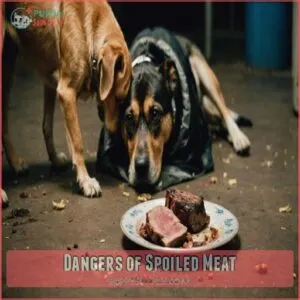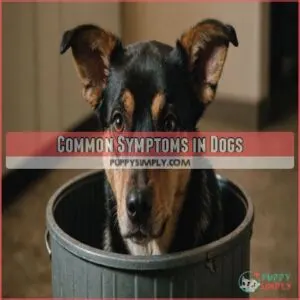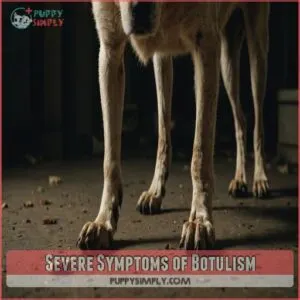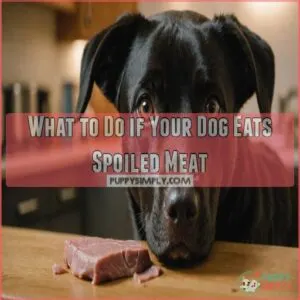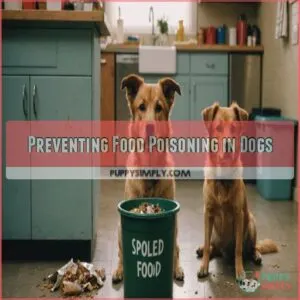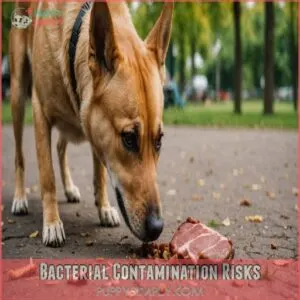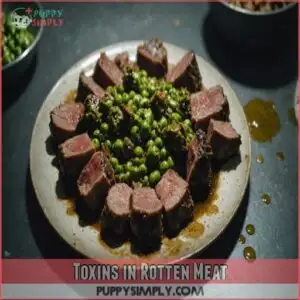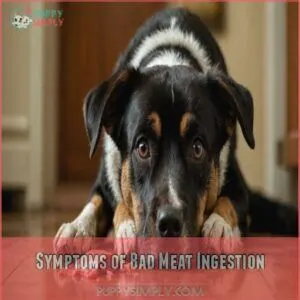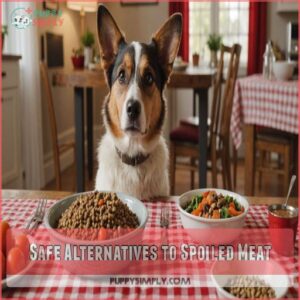This site is supported by our readers. We may earn a commission, at no cost to you, if you purchase through links.
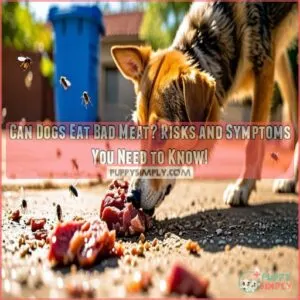 Can dogs eat bad meat? Not a good idea.
Can dogs eat bad meat? Not a good idea.
Spoiled meat is a playground for harmful bacteria like Salmonella and E. coli, which can make your furry friend sick as a dog—literally. Rotten meat can cause vomiting, diarrhea, and even more severe issues like botulism. You might think a dog’s iron stomach can handle it, but food poisoning is no joke. Always be cautious and stick to fresh, cook well, and don’t feed Rover anything you wouldn’t eat yourself.
Curious about what to do if your dog raids the trash? Those insights are just a few scrolls away.
Table Of Contents
- Key Takeaways
- Dangers of Spoiled Meat
- Symptoms of Food Poisoning
- Can Dogs Eat Slightly Spoiled Meat?
- What to Do if Your Dog Eats Spoiled Meat
- Preventing Food Poisoning in Dogs
- Bacterial Contamination Risks
- Toxins in Rotten Meat
- Symptoms of Bad Meat Ingestion
- Treatment Options for Food Poisoning
- Safe Alternatives to Spoiled Meat
- Frequently Asked Questions (FAQs)
- Can dogs eat cooked meat?
- Is eating a lot of meat bad for the body?
- Can a dog eat soiled meat?
- What happens if a dog eats uncooked meat?
- Can dogs eat meat that has been sitting out?
- Can pets eat uncooked meat?
- Why can dogs eat Spoiled meat?
- Should I feed Spoiled meat to my dog?
- Can dogs eat old raw meat?
- Can dogs get sick from eating rotten meat?
- Can dogs eat spoiled chicken?
- What happens if a dog eats spoiled meat?
- Is it safe for dogs to eat expired meat?
- Can animals eat spoiled meat?
- Can dogs eat meat that smells off?
- How to recognize spoiled meat in dog food?
- Can spoiled meat affect a dogs mood?
- Is there a safe amount of spoiled meat?
- How does temperature affect meat spoilage for dogs?
- What are long-term effects of spoiled meat on dogs?
- Conclusion
Key Takeaways
- You shouldn’t feed your dog spoiled meat; it can cause serious food poisoning.
- If your dog ingests spoiled meat, it may be at risk for food poisoning from bacteria like Salmonella or Clostridium perfringens, which is often found in bad chicken, watch for vomiting, diarrhea, lethargy, or fever; seek veterinary help if symptoms are severe.
- Always feed your dog fresh, cooked meat, and avoid processed meats.
- Proper meat storage and disposal are crucial to prevent food poisoning.
Dangers of Spoiled Meat
When your dog eats spoiled meat, they’re not just indulging in an unpleasant snack—they’re inviting a host of harmful bacteria and toxins.
These pathogens can lead to food poisoning, causing serious illness and discomfort for your furry friend.
Harmful Bacteria and Toxins
When your dog eats spoiled meat, harmful bacteria and toxins are no joke.
Even with their tough stomachs, dogs can fall prey to these invisible foes.
- Bacterial Resistance: Some germs are stronger than you’d think.
- Toxin Removal Methods: Not all bad meat can be made safe.
- Spoilage Indicators: Trust your nose—bad smells mean trouble.
Risk of Food Poisoning in Dogs
Some spoiled meat poses a significant risk of food poisoning for your dog.
Harmful bacteria and toxins can wreak havoc on their system, causing foodborne illness.
Be mindful of spoilage signs and prioritize pet food safety to avoid trouble.
Here’s a quick guide to understand these risks better:
| Danger | Impact |
|---|---|
| E-coli | Diarrhea |
| Salmonella | Vomiting |
| Clostridium botulinum | Lethargy |
| Staphylococcus | Fever |
Symptoms of Illness in Dogs
Spotting illness in dogs after they munch on spoiled meat can be easier if you know what to look for.
Watch for these telltale signs:
- Vomiting to clue you in on digestive issues.
- Diarrhea that demands quick remedies.
- Lethargy signals serious health risks.
- Fever hints at foodborne illnesses.
- Head shaking could indicate seizure triggers.
Stay alert to keep Fido safe!
Symptoms of Food Poisoning
You might think your dog has a cast-iron stomach, but even the most adventurous pups can suffer from food poisoning if they eat bad meat.
Watch for signs like vomiting, diarrhea, or something more serious, and don’t hesitate to call the vet if you notice any troubling symptoms.
Common Symptoms in Dogs
Your dog’s stomach might grumble if it eats bad meat, leading to vomiting and diarrhea.
Just like us, dogs feel lousy with abdominal pain, mild fever, or nausea.
Keep an eye out for these signs as they can swiftly lead to dehydration.
Ensuring proper dog nutrition and managing canine diarrhea effectively can keep them healthy and comfortable.
Severe Symptoms of Botulism
Imagine your dog’s muscles turning to jelly—it’s not a joke. Botulism in dogs is serious.
It can lead to paralysis in dogs, affecting limbs and even causing botulism respiratory failure, similar to the risks associated with a diet lacking essential nutrients, such as those found in some low-quality grain-free dog food.
You’ll spot dog neurological symptoms like weakness, shaking, or stumbling. It’s a dicey situation, especially if your pup’s eaten spoiled meat.
Treatment’s vital, so guarantee safe meat for dogs.
Importance of Prompt Medical Attention
If your dog eats bad meat, don’t sit back and hope for the best. Swift action can save the day!
Watch for signs like dog diarrhea or loss of appetite, and if your dog skips meals for 48 hours, consider how to get dog to eat when sick. Time is critical in dog health emergencies.
A timely medical response and vet intervention can make all the difference. Ensuring pet emergency care is your best bet for food poisoning treatment.
Can Dogs Eat Slightly Spoiled Meat?
You might think your dog’s stomach can handle slightly spoiled meat, but even a small amount can be risky.
It’s best to keep your furry friend safe by sticking to fresh food.
Risks of Feeding Spoiled Meat
Vomiting, diarrhea, and other unsettling symptoms can lead to more serious issues in your dog’s health. Watch out for spoiled meat; it’s not just about a smelly mess.
- Meat Storage Tips: Keep it fresh and chilled.
- Avoiding Cross Contamination: Clean those surfaces!
- Dog Digestive Health: Important as ever.
- Pet Food Recalls: Stay updated.
Safe Quantities of Spoiled Meat
There’s no such thing as a "safe" amount of spoiled meat for your dog.
Even a tiny bit can harbor bacteria like E. coli, which can lead to serious health issues.
Pay close attention to meat expiration dates and use proper dog food storage techniques.
Spoiled meat smells awful; trust your nose!
Remember, good canine nutrition means fresh food.
Preventing spoiled meat is key to keeping your furry friend healthy.
Always check for signs of spoilage before feeding your dog any meat.
Importance of Caution
Even slightly spoiled meat is a roll of the dice for your dog. It may seem harmless, but potential risks lurk. Here’s why you should avoid it:
- Food Safety Guidelines stress fresh over risky leftovers.
- Canine Health Risks are hidden in spoiled meat.
- Pet Owner Responsibility means being aware that spoiled meat can harbor bacteria like E. coli and cause vomiting and diarrhea, making it crucial to follow safe dog food guidelines for safe meat handling. Pet Owner Responsibility means opting for safe dog food.
- Meat Handling Tips prevent veterinary emergencies. Keep it fresh!
What to Do if Your Dog Eats Spoiled Meat
If your dog sneaks a bite of spoiled meat, don’t panic, but do take action right away.
Keep a close eye on their behavior and make sure they stay hydrated with fresh water.
Monitoring Your Dog’s Condition
You’ve got to keep an eagle eye on your dog if they’ve nibbled on bad meat.
Look for changes in behavior, such as dizziness and seizures, as these could indicate severe food poisoning.
Note how frequently diarrhea and vomiting occur, as dehydration risk rises, and be aware that dogs can produce more stomach acid than humans, but this doesn’t make them immune to food poisoning risks.
Track appetite loss and water intake.
Here’s a quick guide:
| Symptom | Frequency | Action Needed |
|---|---|---|
| Diarrhea frequency | Often | Contact vet |
| Vomiting duration | Over 24 hours | Seek help |
| Behavior changes | Noticeable | Monitor closely |
Providing Fresh Food and Water
After keeping a close eye on your dog’s symptoms, it’s important to offer them fresh food and water.
Ensuring water bowl hygiene is key to prevent dehydration risks.
Consider safe, dog-friendly meat or homemade dog food as alternatives.
Always stick to fresh meat sources and follow food storage tips to maintain canine nutrition.
Remember, pet safety comes first!
Preventing Food Poisoning in Dogs
To keep your furry friend safe, always make sure to feed them fresh, cooked meat and steer clear of processed options.
Fresh, cooked meat is key for your furry friend’s health.
Properly storing food in your fridge or freezer helps avoid spoilage, saving you from potential vet bills and a very unhappy pooch.
Feeding Fresh and Cooked Meat
So you’ve kept a sharp eye to make sure your dog doesn’t munch on spoiled meat.
Next up is feeding fresh and cooked meat safely.
Good meat safety means focusing on dog nutrition.
A raw diet might seem tempting, but cooked vs. raw is a debate.
For most, properly cooked meat makes it safer for dogs to eat pork and prevents food poisoning.
Avoiding Processed Meats
Now that you’re feeding your dog fresh, cooked meat, let’s talk about processed meats.
They’re often loaded with salt, preservatives, and other things that aren’t good for your furry friend.
For instance, if you’re browsing for products related to bad meat dogs, you might want to check out bad meat dog products.
Skip the sausages, bacon, and ham.
Instead, explore healthier meat choices like chicken for dogs or lean beef.
Homemade meat recipes are a great option, too!
Think of it as preparing a delicious and safe meal for your best buddy.
You’ll be giving your dog the best possible dog care.
Proper Meat Storage and Disposal
Processed meats might seem handy, but storing fresh meat properly keeps your furry friend safe.
Keep meat in the fridge or freezer to avoid spoilage, especially since unopened dry dog food typically lasts 12-18 months, while opened treats should be consumed within two months as per Safe Dog Food Storage.
Always check expiration dates and dispose of leftovers responsibly.
Leaving spoiled meat around is a recipe for disaster.
Responsible pet ownership means taking these steps seriously, ensuring your dog’s nutrition stays on point.
Bacterial Contamination Risks
When your dog eats bad meat, it can encounter harmful bacteria like Salmonella and E-coli lurking in every bite.
These bacteria are no joke and can lead to serious health issues for your furry friend, so always keep spoiled meat off their menu.
Types of Harmful Bacteria
Guarding your pup from food poisoning kicks off with understanding bacterial strains like E. coli and Salmonella.
These nasties lurk in spoiled meat, threatening dog wellness and gut health.
Bacteria can upset your furry friend’s tummy, leading to messy pathogen transmission adventures.
Keep things safe with fresh food, supporting their food safety and your peace of mind.
Sources of Bacterial Contamination
Where’s the bacteria lurking in your dog’s meals? Think about it.
Poor food handling can quickly invite trouble.
Here’s a quick list of sources to watch:
- Raw Meat Handling: Always tricky with bacteria risking contamination.
- Moldy Pet Food: A quiet threat hiding toxins.
- Dirty Water Sources: Can harbor harmful germs.
- Unhygienic Feeding Areas: Breeding grounds for bacteria.
Stay cautious!
Impact on Canine Health
Imagine this: your dog eats bad meat.
Sure, they’ve strong stomachs, but harmful bacteria don’t care.
They love chaos and can wreak havoc on your dog’s gut health and immune systems.
E. coli and Salmonella are typical culprits, leading to food allergies and other health issues.
Be aware of toxic food items like Chokecherry Toxicity Risks that can cause severe symptoms, prioritize pet safety with balanced canine nutrition, avoiding spoiled food.
Toxins in Rotten Meat
Rotten meat isn’t just unpleasant; it’s a toxic hazard for your dog. Those nasty toxins can cause serious illness, so always choose fresh food for your furry friend.
Types of Toxins in Spoiled Meat
Spoiled meat presents a nasty bouquet of toxin types that threaten your dog’s health.
Among these, bacterial toxins and mycotoxin risks lurk like unwelcome guests at a dinner party.
If your dog has eaten spoiled meat, consider products like Restoviebel03-20 for potential relief (see dog spoiled meat solutions).
Spoilage pathogens break down meat, creating foodborne toxins that can be harmful to your pup.
Keep an eye out for:
- Botulinum toxin
- Penitrem-A
- Salmonella toxin
- E. coli byproducts
- Staphylococcal toxins
Effects of Toxins on Dogs
Rotten meat toxins wreak havoc on your dog’s body.
Imagine those toxins sneaking into the bloodstream, harming important organs like the liver.
Puppies, with their developing systems, are especially at risk.
Over time, these nasty invaders can cause real damage.
So, what’s the smart move? Focus on toxin prevention tips, especially when it comes to sick dogs and food refusal Recognizing Sick Dog Appetite Loss, and make sure dog food toxin safety is a priority to protect your furry friend.
Importance of Avoiding Spoiled Meat
Imagine the unpleasant surprise of finding out your dog just ate something nasty from your trash.
It’s essential to avoid spoiled meat to protect your furry friend.
Toxins in rotten meat lead to food poisoning and other health issues.
Focus on dog food safety by storing meat properly, spotting spoiled meat signs, and choosing healthy alternatives.
Symptoms of Bad Meat Ingestion
When your dog eats bad meat, look for signs like vomiting, diarrhea, or unusual lethargy—they’re like your pet’s way of saying, "Help, I need a vet!"
It’s very important to act fast and get medical attention if these symptoms arise, as early treatment can prevent more serious health issues.
Gastrointestinal Distress Signs
When your furry friend gobbles down bad meat, symptoms might pop up faster than a doggy dash.
Watch out for vomiting, diarrhea, or even bloating.
These gastrointestinal distress signs can also include abdominal pain and a sudden loss of appetite.
It’s like their tummy is on a wild roller coaster ride—grab that leash and call the vet for advice!
Behavioral Changes in Dogs
You might notice your dog’s behavior shift after eating bad meat.
Lethargy, sudden aggression, or a sense of anxiety can show up.
A dog that has eaten spoiled meat may experience vomiting, diarrhea, and fever due to salmonella and other bacteria.
Watch for unexpected fear or hiding, as they might signal discomfort.
Just like folks avoid that last slice of mystery meat, keeping an eye on these changes helps your furry friend stay in the pink.
Immediate Medical Attention Indicators
Severe symptoms demand immediate vet care.
Watch for seizures, paralysis—that’s a serious situation.
Loss of coordination or lethargy are also warning signs.
Blood in your dog’s stool is a big red flag.
Don’t delay; get help if you see these symptoms.
Speedy treatment gives your pup the best chance.
Acting fast can save their life.
Treatment Options for Food Poisoning
If your dog gets a case of food poisoning, don’t worry, there are ways to help.
You’ll need to offer supportive care at home.
Consider veterinary interventions.
Manage their diet during recovery to help them feel better quickly.
Supportive Care at Home
Spotting signs of food poisoning is just the start.
At home, prioritize keeping your dog comfortable and recovering. Focus on:
- Hydration: Provide plenty of water to prevent dehydration.
- Rest: Allow your dog to rest, aiding faster recovery.
- Bland Diet: Offer simple foods like boiled chicken to soothe their stomach.
With attentive care, your furry friend bounces back quicker!
Veterinary Interventions and Medication
While home care soothes your dog’s tummy troubles, sometimes a vet’s expertise is needed.
Antibiotics can tackle bacterial infections, and fluid therapy helps with dehydration.
Anti-emetics are handy to stop vomiting, while probiotics encourage a happy gut.
Remember, supportive care sets the stage for recovery, but professional help guarantees your furry friend bounces back quickly and safely.
Dietary Management During Recovery
After a bout of food poisoning, help your fur baby bounce back strong with the right dietary steps.
Think of hydration as your dog’s superhero sidekick, keeping everything flowing smoothly.
Add probiotics to their meal to fight off bad guys in the gut.
Got a fussy eater? Gradual feeding with a bland diet calms sensitive tummies.
- Watching your pup perk up
- Trusting in a simple meal plan
- Ensuring a smooth recovery
Safe Alternatives to Spoiled Meat
When your dog gives you those hopeful puppy eyes at mealtime, skip the spoiled meat and opt for nutritious commercial dog food instead.
For a tastier twist, try whipping up some homemade meals or offering healthy snacks that’ll keep their tails wagging.
Nutritious Commercial Dog Foods
When caring for your furry friend after food poisoning, think nutritious commercial dog foods.
They’re safe, don’t have harmful bacteria, and come in many options.
Ingredients, Price, Quality, and Additives play roles in selecting the right brand.
Use this handy table:
| Ingredient | Brand Comparison |
|---|---|
| High-quality | Taste of the Wild |
| Affordable Price | Blue Buffalo |
| No Additives | Merrick |
| Premium Quality | Royal Canin |
Homemade Dog Food Options
Creating homemade dog food offers control over ingredients, addressing allergy concerns.
You’ll need balanced homemade dog food recipes to make sure nutritional needs are met.
When selecting ingredients, consider visiting a platform that offers dog food ingredients to ensure the best options for your dog.
Ingredient safety is paramount; research recipes carefully.
Consider a cost comparison with commercial brands.
Remember, a vet’s advice is very important before making significant dietary changes.
Proper preparation prevents food poisoning.
Healthy Treats and Snacks for Dogs
Shifting from homemade meals, you might think about offering healthy treats and snacks for your dog.
Toss them a dental chew or safe fruit snack.
Homemade dog treats and natural dog food are great options, too.
They provide a safe, tasty alternative to spoiled meat.
Keep your furry friend happy with these healthy food options instead of risking illness.
Frequently Asked Questions (FAQs)
Can dogs eat cooked meat?
Absolutely, you can feed cooked meat to dogs as a treat or part of their diet.
Just make sure it’s cooked thoroughly, unseasoned, and free from bones.
Stick to moderation, swapping in veggies and balanced dog food.
Is eating a lot of meat bad for the body?
Think of your body as a well-oiled machine; too much meat can clog its gears, leading to heart disease, digestive problems, or weight gain.
Balance your plate with fruits, veggies, grains for smooth, efficient operation.
Can a dog eat soiled meat?
Dogs shouldn’t eat soiled meat because it can cause food poisoning.
Harmful bacteria, like Salmonella or E. coli, can make your pup sick.
Always opt for fresh, cooked meat to keep your furry friend healthy and safe.
What happens if a dog eats uncooked meat?
Like a Trojan horse, raw meat hides dangers.
Your dog could get sick from bacteria.
Cook it thoroughly to be safe.
Monitor for vomiting or diarrhea.
Consult your vet if worried.
Can dogs eat meat that has been sitting out?
You shouldn’t feed your dog meat that’s been sitting out.
Bacterial growth can lead to food poisoning with symptoms like vomiting and diarrhea.
Always opt for fresh meat to keep your furry friend safe and healthy.
Can pets eat uncooked meat?
Think of uncooked meat as a double-edged sword for pets.
While it’s natural, it harbors harmful bacteria like salmonella.
Cooking meat lowers infection risks.
Always consult your vet before trying a raw food diet to stay safe.
Why can dogs eat Spoiled meat?
Spoiled meat can be risky for dogs because it contains harmful bacteria and toxins.
Dogs might handle it better than humans, but the risk of serious illnesses like botulism or bacterial infections makes it unsafe.
Avoid it.
Should I feed Spoiled meat to my dog?
Feeding your dog spoiled meat is like inviting trouble into your home.
Even if dogs have tough stomachs, spoiled meat can lead to serious health issues.
Stick with fresh food to keep your furry friend healthy and happy.
Can dogs eat old raw meat?
Old raw meat isn’t safe for dogs.
It might’ve harmful bacteria that can make your furry friend sick.
Even if they’ve a strong stomach, it’s better to stick with fresh, safe meat options.
Can dogs get sick from eating rotten meat?
Yes, rotten meat harbors dangerous bacteria.
Don’t risk it! Even a little bit can make your pup seriously ill.
Always feed your dog fresh, safe food. Their health depends on it!
Can dogs eat spoiled chicken?
Spoiled chicken can harm your dog, causing food poisoning from bacteria like Salmonella and E-coli.
It’s tempting to let them scavenge, but it’s not worth the risk.
Stick to fresh meat to keep them healthy and happy.
What happens if a dog eats spoiled meat?
When your dog dives into spoiled meat, it’s a recipe for trouble.
That trouble often leads to symptoms like vomiting, diarrhea, and loss of appetite.
These can escalate to serious conditions, demanding prompt vet attention to guarantee safety.
Is it safe for dogs to eat expired meat?
Expired meat isn’t safe for dogs due to harmful bacteria.
Even if it looks fine, it may still harbor nasty pathogens.
Stick to fresh, cooked options to keep your furry pal healthy and happy.
Can animals eat spoiled meat?
Animals shouldn’t eat spoiled meat due to harmful bacteria like Salmonella and E-coli.
These can cause serious illnesses, leading to symptoms like vomiting and diarrhea.
It’s best to stick to fresh, properly stored food for safety.
Can dogs eat meat that smells off?
Feeding your dog meat that smells off isn’t a good idea.
Even if dogs have strong stomachs, spoiled meat can lead to serious illness.
Stick to fresh meat to keep your furry friend safe and healthy.
How to recognize spoiled meat in dog food?
Look for changes in color, texture, or smell.
Mold, unusual odors, or slimy textures are bad signs.
If it’s questionable, toss it! Your dog’s health depends on it.
Don’t risk it.
Can spoiled meat affect a dogs mood?
Spoiled meat can affect your dog’s mood.
If they’re feeling queasy or uncomfortable because of food poisoning, they might become irritable or lethargic.
Keep an eye out for these signs and consult your vet if needed.
Is there a safe amount of spoiled meat?
Slightly spoiled meat might seem safe, but steering clear is smarter.
Even tiny traces of toxins can trigger tummy troubles.
Play it safe; stick to fresh food.
Flirting with foodborne ailments isn’t worth the risk for Fido!
How does temperature affect meat spoilage for dogs?
Keeping meat at high temperatures speeds up spoilage, inviting bacteria to crash the party.
This isn’t good for dogs.
Keep meat cool to avoid these unwanted guests and protect your furry friend’s belly from potential harm.
What are long-term effects of spoiled meat on dogs?
Feeding your dog spoiled meat can lead to serious long-term health problems.
These include chronic digestive issues, recurring infections, and potentially life-threatening diseases like botulism.
Always prioritize fresh, safe food to keep your furry friend healthy and happy.
Conclusion
Think of spoiled meat as an uninvited guest at your dog’s dinner party.
Feeding bad meat to your dog can lead to serious health issues, as harmful bacteria and toxins throw a painful party in your pet’s stomach.
It’s crucial to stick to safe, fresh alternatives to avoid any food poisoning troubles for your furry friend.
Ultimately, a cautious approach makes your dog’s meals both tasty and safe. Remember, don’t serve what you wouldn’t eat!

